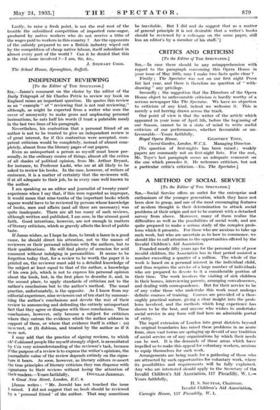INDEPENDENT REVIEWING
[To the Editor of THE SPECTATOR.] SIR,—Janus's comment on the' choice 'by the 'editor of the Daily Telegraph of Sir Charles Petrie to review my book on England raises an important question. He quotes this review as an " example " of " reviewing that is not real reviewing," although, as might be expected from a writer who uses the cover of anonymity to make gross and unpleasing personal insinuations, he eats half his words (I trust a palatable meal) in the last two lines of his paragraph.
Nevertheless, his contention that a personal friend of an author is not to be trusted to give an independent review is of great interest, for if this contention were accepted, com- petent criticism would be completely, instead of almost com- pletely, absent from the literary pages of our papers.
Even as unimportant a person as myself must know per- sonally, in the ordinary course of things, almost all the critics of all shades of political opinion, from Mr. Arthur Bryant, for instance, to Professor Laski, who are at all likely to be asked to review his books. In the case, however, of writers of eminence, it is a matter of certainty that the reviewers will, if at all adequate to their job, be in every case well known to the author.
I am speaking as an editor and journalist of twenty years' experience when I say that, if this were regarded as improper, it would mean that nine-tenths of the important books which appear would have to be reviewed by persons whose knowledge of books, men and affairs (and all three are necessary) was quite inadequate. There are all too many of such reviews, although written and published, I am sure, in the utmost good faith. Good intentions, however, are not enough in matters of literary criticism, which so gravely affects the level of public taste. .
If Janus wishes, as I hope he does, to break a lance in a good cause, he should direct his attention, not to the names of reviewers or their personal relations with the authors, but. to their qualifications. He will find plenty of occasion for acid comment without indulging in personalities. It seems to be forgotten today that, for a review to be worth the paper it is printed on, the reviewer must add to a detailed knowledge of the subject at least equal to that of the author, a knowledge of his own job, which is not to express his personal opinion about the book, but, in the first place to describe it, and, in the second place, to apply standards of criticism not to the author's conclusions but to the author's method. The usual practice, unfortunately, is the opposite. As I know from my editorial experience, nine reviewers out of ten start by summar- izing the author's conclusions and devote the rest of their review to announcing and defending,the entirely unimportant fact that they agree or disagree with those conclusions. These conclusions, however, only become a subject for criticism where they outrun the evidence which the author adduces in support of them, or where that evidence itself is either : (a) into sect, or (b) dubious, and treated by the author as if it art re not.
I may add that the practice of signing reviews, to which ole-f ishioned people like myself strongly object, is necessitated by Vais very misunderstanding of the reviewer's task, because if the purpose of a review is to express the writer's opinions, the journalistic value of the review depends entirely on the signa- ture it bears. As soon, however, as literary editors re-assert the true principles of literary criticism they can dispense with signatures to their reviews without losing the attention of [Janus writes : " Mr. Jerrold has not touched the issue I raised. I did, not suggest that no, book should be reviewed by a ' personal friend ' of the author. That may sometimes be inevitable. But I did and do suggest that as a matter of general principle it is not desirable that a writer's books should be reviewed by a colleague on the same paper, still less an editor's by a member of his staff."]














































 Previous page
Previous page